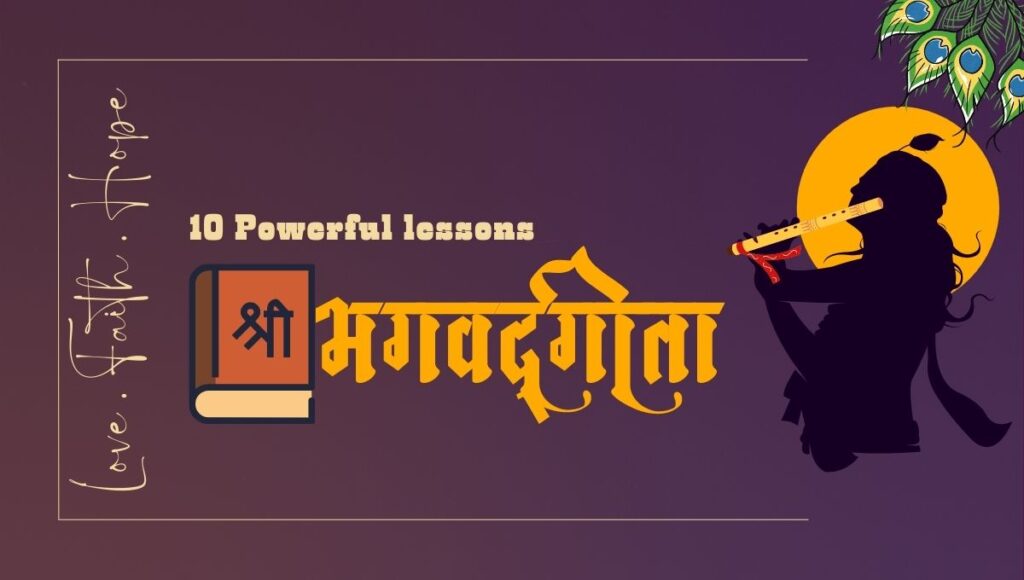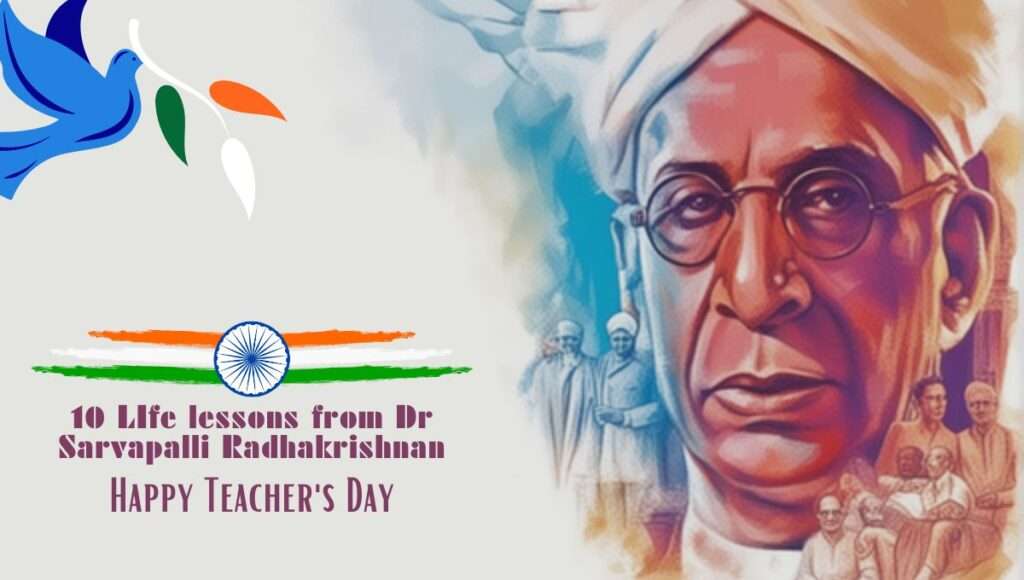Lord Rama: 7 great life lessons from Ramayan.
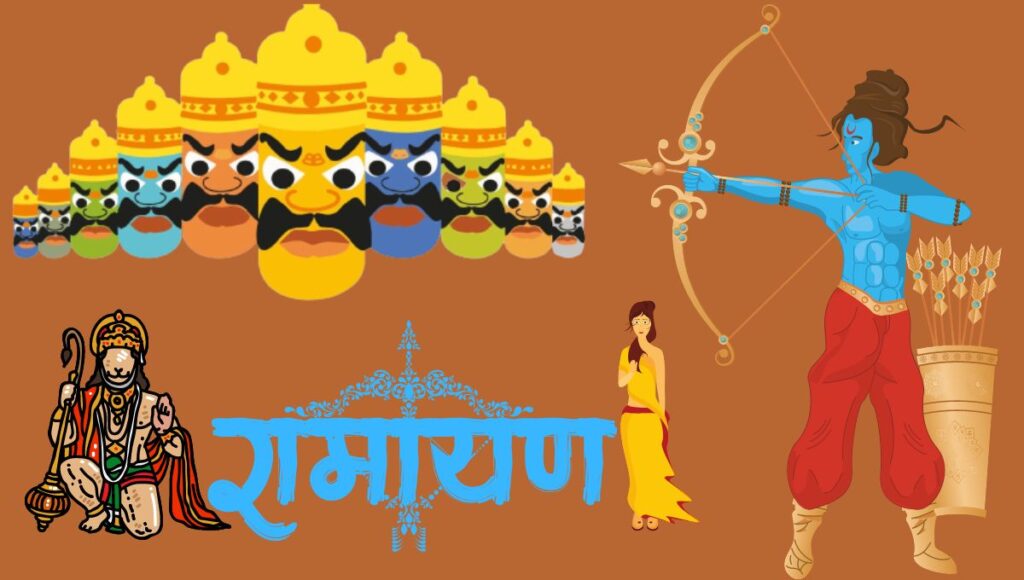
Hello, Dear reader!
Jai Shri Rama Welcome to my blog, where I share my thoughts and insights on various topics related to Inspiration, Hinduism, spirituality, and culture and all valuable insights that contributes to personal development. Today, I want to talk about one of the most fascinating and influential stories in the world: The Ramayana.🙏
The Ramayana is an ancient Indian epic, composed sometime in the 5th century BCE, by the sage Valmiki. It narrates the life and adventures of Rama, the prince of Ayodhya, who is considered an incarnation of Vishnu, the supreme god of Hinduism. The Ramayana is not just a story, but a sacred scripture that teaches us many valuable lessons about life, morality, and devotion.📚
You might be wondering: why is the Ramayana relevant today? What can we learn from this ancient story in our modern times? How can we apply the teachings of the Ramayana in our daily lives? Well, these are some of the questions that I will try to answer in this blog post.😊
In this blog post, I will discuss seven great life lessons from the Ramayana that are relevant today. These lessons are:
– Respect your parents and elders.
– Be loyal to your spouse and family.
– Choose your friends wisely and be grateful to them.
– Be humble and compassionate.
– Be courageous and determined.
– Follow your dharma (duty) and karma (action).
– Have faith in God and yourself.
These lessons are based on the examples and actions of Rama and other characters in the Ramayana. They are not only applicable to Hindus, but to anyone who wants to live a righteous and fulfilling life. They are universal principles that can help us overcome our challenges and achieve our goals.💯
Before I dive into these lessons, let me give you a brief overview of the Ramayana story and its main characters. This will help you understand the context and significance of these lessons better.🙌
The Ramayana story begins with the birth of Rama, the eldest son of King Dasharatha and Queen Kaushalya of Ayodhya. Rama is a perfect prince who excels in everything he does. He is handsome, brave, intelligent, virtuous, and devoted to God. He has three half-brothers: Lakshmana, Bharata, and Shatrughna. He also has a beautiful and faithful wife, Sita, who is the daughter of King Janaka of Mithila.🌟
Rama’s life takes a dramatic turn when his stepmother Kaikeyi, who wants her son Bharata to become the king instead of Rama, asks Dasharatha to banish Rama to the forest for 14 years. Dasharatha reluctantly agrees, as he had promised Kaikeyi two boons in the past. Rama accepts his fate without any complaint and leaves for the forest with Sita and Lakshmana. Bharata refuses to take the throne and pleads with Rama to return, but Rama insists on obeying his father’s command. Bharata then takes Rama’s sandals and places them on the throne as a symbol of his authority until Rama returns.🙏
In the forest, Rama meets many sages and protects them from the attacks of demons. He also befriends Hanuman, the monkey god, who becomes his loyal servant and devotee. He also helps Sugriva, the king of monkeys, to regain his kingdom from his brother Vali. In return, Sugriva promises to help Rama find Sita, who is kidnapped by Ravana, the king of Lanka (Sri Lanka), while Rama and Lakshmana are chasing a golden deer sent by Ravana as a decoy.😱
Ravana is a powerful demon who has ten heads and twenty arms. He is also a great devotee of Shiva, who has granted him many boons that make him invincible to gods and humans. He is arrogant, cruel, lustful, and greedy. He wants to make Sita his wife by force, but Sita resists him with her virtue and faith in Rama. She waits for Rama to rescue her from Ravana’s clutches.💔
Rama then gathers an army of monkeys and bears led by Hanuman and Sugriva. He also gets the support of Vibhishana, Ravana’s brother who defects to Rama’s side due to his righteousness. With their help, Rama builds a bridge across the ocean and reaches Lanka. There he fights a fierce battle with Ravana and his army of demons. After many days of fighting, Rama finally kills Ravana with a special arrow given by Agastya , a sage who blesses him before the war. He then frees Sita from captivity and returns to Ayodhya with her and his allies.🎉
However, Rama’s troubles are not over yet. He learns that some people in Ayodhya doubt Sita’s chastity, as she had lived in Ravana’s palace for a long time. To prove her innocence, Sita undergoes a fire test, in which she enters a blazing fire and comes out unharmed. Rama then accepts her as his wife again and becomes the king of Ayodhya. He rules his kingdom with justice and prosperity for many years. This period is known as Rama Rajya, the ideal state of affairs on earth.🌎
However, Rama’s happiness is short-lived. He hears a washerman criticizing his wife for allowing Sita to stay with him, as she had lived under another man’s roof. Rama feels that he has to uphold his duty as a king and maintain the public opinion. He decides to banish Sita to the forest, even though he loves her dearly and knows that she is pure. Sita is heartbroken, but she accepts her fate and leaves for the forest with Lakshmana.
There she meets Valmiki, the author of the Ramayana, who gives her shelter in his ashram (hermitage). She also gives birth to Rama’s twin sons, Lava and Kusha, who are trained by Valmiki in the art of warfare and the knowledge of the Ramayana.
After many years, Rama decides to perform a horse sacrifice (Ashvamedha) to expiate his sins and assert his sovereignty. He sends a horse across the land, accompanied by his army led by Shatrughna. Whoever stops the horse has to fight with Rama’s army or accept his supremacy. The horse reaches Valmiki’s ashram, where Lava and Kusha capture it and challenge Rama’s army.
They defeat many warriors, including Lakshmana, Bharata, and Shatrughna, with their skill and courage. They also recite the Ramayana to them, which moves them to tears. Rama then comes to fight with them, but he is amazed by their resemblance to him and their knowledge of the Ramayana. He then learns from Valmiki that they are his sons and that Sita is still alive and faithful to him. He is overjoyed and asks Sita to come back to him.😍
However, Sita is tired of proving her innocence again and again. She asks Mother Earth, who had given birth to her, to take her back if she is true to Rama. As she says this, the earth opens up and Sita enters into it, leaving behind a stunned Rama and everyone else. Rama then realizes that Sita was indeed pure and faithful and that he had wronged her by doubting her.
He laments for his loss and praises her virtues. He then decides to rule his kingdom for the rest of his life as a single man, devoted to his people and God. He also takes Lava and Kusha as his heirs and trains them in kingship. He finally returns to God after completing his earthly mission.🙏
This is a brief summary of the Ramayana story, which has many more details and subplots that I have not mentioned here. The Ramayana is not just a story of Rama, but also of Sita, Lakshmana, Hanuman, Ravana, Vibhishana, Sugriva, Vali, Dasharatha, Kaikeyi, Bharata, Shatrughna, Agastya, Valmiki, Lava, Kusha, and many other characters who play important roles in the epic. Each character has a unique personality, a distinct role, and a valuable lesson to teach us.🙌
The Ramayana is not only a source of entertainment, but also of inspiration, education, and transformation. It teaches us how to live our lives according to dharma (righteousness), how to face our difficulties with courage and faith, how to love our family and friends with loyalty and gratitude, how to serve our society and country with dedication and sacrifice, how to worship God with devotion and surrender, and how to attain moksha (liberation) from the cycle of birth and death.🙏
The Ramayana is not only relevant today, but also timeless. It transcends the boundaries of time, space, culture, religion, language, and nationality. It appeals to people of all ages, genders, backgrounds, beliefs, and interests.
It has been translated into many languages, adapted into many forms of art, literature, music, dance, drama, film, television, comics, animation, games, etc., and celebrated in many festivals, rituals, ceremonies, pilgrimages, etc. It has influenced many other stories, traditions, values, customs, symbols, etc., in India and beyond.
😊Lesson 1: Respect your parents and elders from Lord RAMA.

The first lesson that we can learn from the Ramayana is to respect our parents and elders. This is a very important value in Hindu culture, as well as in many other cultures around the world. Respect means to honor, appreciate, and obey someone who is older, wiser, or more experienced than us. Respect also means to be polite, humble, and grateful to someone who has given us life, guidance, or support. 🙏
Rama is a great example of respect for his parents and elders. He always listens to them, follows their advice, and fulfills their wishes. He never argues with them, disobeys them, or disappoints them. He treats them with love, kindness, and reverence. He also respects other elders, such as sages, gurus, kings, and gods. He learns from them, serves them, and worships them. He shows his respect not only by his words, but also by his actions. 💯
One of the most remarkable instances of Rama’s respect for his parents is when he agrees to go into exile for 14 years at the request of his stepmother Kaikeyi. Rama does not question her motive, protest her decision, or resent her action. He accepts her demand as his father’s command and prepares to leave for the forest without any hesitation or complaint. He does not care about his own happiness, comfort, or glory. He only cares about his father’s honor, promise, and duty. He sacrifices his right to the throne and his chance to rule the kingdom for the sake of his father’s word. 🙌
Rama’s respect for his parents is so great that he does not even blame them for his misfortune. He does not think that they are unfair, cruel, or unloving to him. He thinks that they are doing their best for him and that everything is happening according to God’s will. He trusts that his parents have a good reason for sending him to exile and that they are blessing him with their love and prayers. He also asks his brothers and wife to respect his parents and not to speak ill of them. He says:
“My dear brother Lakshmana, do not be angry with our father or mother. They are not at fault. They are acting according to destiny. They are our well-wishers and benefactors. They have given us birth, education, and protection. They have taught us dharma (righteousness), artha (wealth), kama (pleasure), and moksha (liberation).
They have done more for us than we can ever repay. Therefore, we should always respect them, obey them, and serve them. We should never hurt them, disobey them, or leave them. We should always make them happy, proud, and peaceful. This is our highest duty as sons .” 🙏
Rama’s respect for his parents is so inspiring that it moves everyone who hears about it. His brothers, Bharata and Shatrughna, are so touched by his respect that they refuse to take the throne and beg him to return. His wife, Sita, is so impressed by his respect that she decides to accompany him to exile.
His subjects, the people of Ayodhya, are so amazed by his respect that they follow him to the forest and try to persuade him to stay. His allies, the monkeys and bears, are so awed by his respect that they pledge their loyalty and support to him. His enemies, Ravana, and his demons, are so terrified by his respect that they fear his power and wrath. 🙌
Rama’s respect for his parents teaches us a valuable lesson: respect your parents and elders. They are your greatest teachers, guides, and friends. They have given you everything you have: your life, your body, your mind, your soul, your knowledge, your skills, your values, your culture, your identity, your heritage, your legacy.
They have sacrificed a lot for you: their time, their energy, their money, their health, their happiness, their dreams. They have done a lot for you: they have nurtured you, educated you, protected you, supported you, encouraged you, loved you. They have done nothing but good for you: they have always wanted the best for you, always wished the best for you
😊Lesson 2: Be loyal to your spouse and family.

The second lesson that we can learn from the Ramayana is to be loyal to our spouse and family. This is another important value in Hindu culture, as well as in many other cultures around the world. Loyalty means to be faithful, devoted, and committed to someone who is our partner, relative, or friend. Loyalty also means to be honest, trustworthy, and supportive to someone who is our companion, kin, orally. 💕
Sita is a great example of loyalty to her spouse and family. She always loves Rama, follows Rama, and supports Rama. She never doubts Rama, betrays Rama, or leaves Rama. She treats him with respect, affection, and admiration. She also loves his brothers, parents, and friends. She respects them, helps them, and cares for them. She shows her loyalty not only by her words but also by her actions. 💯
One of the most remarkable instances of Sita’s loyalty to her spouse is when she decides to accompany him to exile for 14 years. Sita does not hesitate to leave behind her comfort, luxury, and security in the palace. She does not care about her own happiness, convenience, or safety in the forest. She only cares about her husband’s company, service, and happiness. She sacrifices her right to queenhood and her chance to enjoy the kingdom for the sake of her husband’s word. 🙌
Sita’s loyalty to her spouse is so great that she does not even blame him for her misfortune. She does not think that he is unfair, cruel, or unloving to her. She thinks that he is doing his best for her and that everything is happening according to God’s will. She trusts that her husband has a good reason for sending her to exile and that he is blessing her with his love and protection. She also asks Lakshmana and Hanuman to be loyal to him and not to speak ill of him. She says:
“My dear brother Lakshmana, do not be angry with Rama. He is not at fault. He is acting according to destiny. He is my well-wisher and protector. He has given me love, honor, and happiness. He has taught me dharma (righteousness), artha (wealth), kama (pleasure), and moksha (liberation). He has done more for me than I can ever repay. Therefore, I should always be loyal to him, follow him, and serve him. I should never hurt him, disobey him, or leave him. I should always make him happy, proud, and peaceful. This is my highest duty as a wife .” 💕
Sita’s loyalty to her spouse is so inspiring that it moves everyone who hears about it. Her father, King Janaka, is so touched by her loyalty that he praises her as the ideal daughter. Her mother-in-law, Queen Kaushalya, is so impressed by her loyalty that she blesses her as the ideal daughter-in-law.
Her sisters-in-law, Mandavi, Urmila, and Shrutakirti, are so amazed by her loyalty that they admire her as the ideal sister-in-law. Her friends, Anasuya, Sulabha, Trijata, etc., are so awed by her loyalty that they respect her as the ideal friend. Her enemies, Ravana, Surpanakha, Indrajit, etc., are so terrified by her loyalty that they fear her power and virtue. 🙌
Sita’s loyalty to her spouse teaches us a valuable lesson: be loyal to your spouse and family. They are your greatest partners, relatives, and friends. They have shared everything with you: your joys, your sorrows, your successes, your failures, your hopes, your fears, your dreams, your nightmares.
They have stood by you in every situation: they have supported you when you were weak, they have encouraged you when you were low, and they have celebrated with you when you were high. They have done nothing but good for you: they have always wanted the best for you.
😊 Lesson 3: Choose your friends wisely and be grateful to them

The third lesson that we can learn from the Ramayana is to choose our friends wisely and be grateful to them. This is another important value in Hindu culture, as well as in many other cultures around the world. Friendship means to have a close, mutual, and voluntary relationship with someone who is our companion, confidant, or supporter. Friendship also means to have trust, respect, and affection for someone who is our ally, partner, or benefactor.😊
Hanuman is a great example of friendship with Rama and his family. He always helps Rama, follows Rama, and worships Rama. He never doubts Rama, betrays Rama, or leaves Rama. He treats him with reverence, loyalty, and devotion. He also helps his brothers, wife, and friends. He respects them, protects them, and cares for them. He shows his friendship not only by his words but also by his actions.💯
One of the most remarkable instances of Hanuman’s friendship with Rama is when he crosses the ocean to find Sita in Lanka. Hanuman does not hesitate to take up this difficult and dangerous task. He does not care about his own safety, comfort, or glory. He only cares about his master’s mission, service, and happiness. He sacrifices his own interests and risks his own life for the sake of his master’s love.🙌
Hanuman’s friendship with Rama is so great that he does not even think of himself as a friend but as a servant and a devotee. He does not think that he is doing a favor to Rama, but that he is doing his duty to Rama. He does not think that he is equal to Rama, but that he is inferior to Rama. He does not think that he deserves any reward or recognition from Rama, but that he owes everything to Rama. He also asks Sita and Lakshmana to be faithful to him and not to speak ill of him. He says:
“My dear mother Sita, do not be sad. Rama is not at fault. He is acting according to destiny. He is your well-wisher and protector. He has given you love, honor, and happiness. He has taught you dharma (righteousness), artha (wealth), kama (pleasure), and moksha (liberation).
He has done more for you than you can ever repay. Therefore, you should always be faithful to him, follow him, and serve him . You should never hurt him, disobey him, or leave him. You should always make him happy, proud, and peaceful. This is your highest duty as a wife .” 💕
“My dear brother Lakshmana, do not be angry with Rama. He is not at fault. He is acting according to destiny. He is your well-wisher and protector. He has given you love, honor, and happiness. He has taught you dharma (righteousness), artha (wealth), kama (pleasure), and moksha (liberation).
He has done more for you than you can ever repay. Therefore, you should always be loyal to him, follow him, and serve him . You should never hurt him, disobey him, or leave him. You should always make him happy, proud, and peaceful. This is your highest duty as a brother .”🙏
Hanuman’s friendship with Rama is so inspiring that it moves everyone who hears about it. His friends, Sugriva, Angada, Jambavan, etc., are so touched by his friendship that they follow his example and help Rama in his mission. His enemies, Ravana, Indrajit, Kumbhakarna, etc., are so impressed by his friendship that they praise his courage and strength.
His admirers, Vibhishana, Sita, Lakshmana, etc., are so amazed by his friendship that they honor him as the best among the devotees. His master, Rama, is so awed by his friendship that he embraces him as his own son.🙌
Hanuman’s friendship with Rama teaches us a valuable lesson: choose your friends wisely and be grateful to them. They are your greatest companions, confidants, and supporters. They have shared everything with you: your joys, your sorrows.
😊 Lesson 4: Be humble and compassionate

The fourth lesson that we can learn from the Ramayana is to be humble and compassionate. This is another important value in Hindu culture, as well as in many other cultures around the world. Humility means to be modest, respectful, and unassuming. Compassion means to be kind, empathetic, and generous. Humility and compassion are two qualities that make us human and divine.
Rama is a great example of humility and compassion. He always treats everyone with respect and kindness. He never boasts of his achievements, abilities, or qualities. He never looks down on anyone, regardless of their status, caste, or creed. He never harms anyone, unless it is necessary for justice or dharma (righteousness). He always helps the needy, the weak, and the oppressed. He shows his humility and compassion not only by his words, but also by his actions.
One of the most remarkable instances of Rama’s humility and compassion is when he meets Shabari, an old tribal woman who lives in the forest. Shabari is a devout devotee of Rama, who has been waiting for him for many years. She has heard about his glory and virtues from her guru Matanga , a sage who had blessed her before his death. She has prepared a simple hut and some fruits for Rama’s arrival. She has also tasted each fruit to make sure that they are sweet and ripe for Rama.
When Rama arrives at her hut with Lakshmana, Shabari is overjoyed and overwhelmed. She welcomes them with reverence and love. She offers them water to wash their feet, a seat to rest, and fruits to eat. She tells them about her guru Matanga and his teachings. She praises Rama’s qualities and deeds. She expresses her gratitude and devotion to Rama. She says:
“My dear Lord Rama, you are the supreme lord of the universe. You are the source of all happiness, knowledge, and power. You are the embodiment of dharma (righteousness), artha (wealth), kama (pleasure), and moksha (liberation). You are the best among men, gods, and sages. You are my master, my friend, and my god. You have done more for me than I can ever repay. Therefore, I offer you my humble service, my sincere love, and my total surrender. You are my everything .”
Rama’s humility and compassion are so great that he does not reject Shabari’s hospitality but accepts it with grace and gratitude. He does not mind that she is a tribal woman, who belongs to a low caste and a backward community. He does not mind that she is old, poor, and uneducated. He does not mind that she has tasted the fruits before offering them to him. He does not mind that she has nothing else to offer him but her simple hut and her pure heart. He treats her with respect, kindness, and affection. He says:
“My dear mother Shabari, you are the most blessed among women. You are the most fortunate among devotees. You are the most wise among sages. You have attained the highest state of devotion, which is rare even for gods and sages. You have pleased me more than anyone else with your hospitality, your love, and your faith. You have offered me the best fruits, which are sweetened by your devotion. You have given me the best gift, which is your surrender. You have taught me the best lesson, which is humility .” 💕
Rama’s humility and compassion are so inspiring that they move everyone who hears about it. His brother Lakshmana is so touched by his humility that he learns to respect all beings as equal. His friend Hanuman is so impressed by his compassion that he vows to serve him with all his heart. His enemy Ravana is so amazed by his humility that he regrets his arrogance and pride. His wife Sita is so awed by his compassion that she praises him as the ideal husband. His guru Agastya is so pleased by his humility that he blesses him with success in his mission.🙌
Rama’s humility and compassion teach us a valuable lesson: Be humble.
😊 Lesson 5: Be courageous and determined

The fifth lesson that we can learn from the Ramayana is to be courageous and determined. This is another important value in Hindu culture, as well as in many other cultures around the world. Courage means to be brave, bold, and confident. Determination means to be resolute, persistent and focused. Courage and determination are two qualities that make us strong and successful.🙏
Ravana is a great example of courage and determination. He always pursues his goals, challenges his enemies, and conquers his obstacles. He never fears anyone, surrenders to anyone, or gives up on anything. He treats everyone with contempt, defiance, and aggression. He also pursues his desires, ambitions, and passions. He challenges the gods, kidnaps Sita, and rules Lanka. He shows his courage and determination not only by his words, but also by his actions.💯
One of the most remarkable instances of Ravana’s courage and determination is when he fights with Rama in the final battle. Ravana does not hesitate to face Rama, who is an incarnation of Vishnu, the supreme god of Hinduism. He does not care about his own safety, reputation, or destiny. He only cares about his own pride, power, and glory. He sacrifices his family, friends, and kingdom for the sake of his ego.🙌
Ravana’s courage and determination are so great that he does not even acknowledge Rama as his superior but as his equal or inferior. He does not think that he is doing wrong, but that he is doing right. He does not think that he is doomed, but that he is destined. He does not think that he deserves any punishment or mercy from Rama, but that he owes nothing to Rama. He also asks Sita and Vibhishana to be loyal to him and not to speak ill of him. He says:
“My dear wife Sita, do not be sad. Rama is not your lord. He is your enemy. He is a coward, a liar, and a cheat. He has abandoned you, insulted you, and harmed you. He has taught you nothing but misery, sorrow, and pain. He has done nothing for you but evil, injustice, and cruelty. Therefore, you should always hate him, reject him, and curse him. You should never love him, accept him, or bless him. You should always make him unhappy, ashamed, and angry. This is your highest duty as a wife .” 💔
“My dear brother Vibhishana, do not be foolish. Rama is not your friend. He is your foe. He is a weakling, a hypocrite, and a traitor. He has deceived you, betrayed you, and used you. He has taught you nothing but cowardice, falsehood, and treachery. He has done nothing for you but harm, injustice, and cruelty. Therefore, you should always despise him, oppose him, and fight him. You should never respect him, support him, or serve him . You should always make him unhappy, ashamed, and angry. This is your highest duty as a brother .”🙅♀️
Ravana’s courage and determination are so inspiring that they move everyone who hears about it. His allies, Indrajit, Kumbhakarna, Meghanada, etc., are so touched by his courage that they fight for him till their last breath. His enemies, Rama, Lakshmana, Hanuman, etc., are so impressed by his determination that they praise his valor and skill. His admirers, Mandodari, Maricha, Ahalya, etc., are so amazed by his courage that they honor him as the best among the demons. His master, Shiva, is so awed by his determination that he grants him many boons and weapons.🙌
Ravana’s courage and determination teach us a valuable lesson: Be courageous.
😊Lesson 6: Have faith in God and yourself
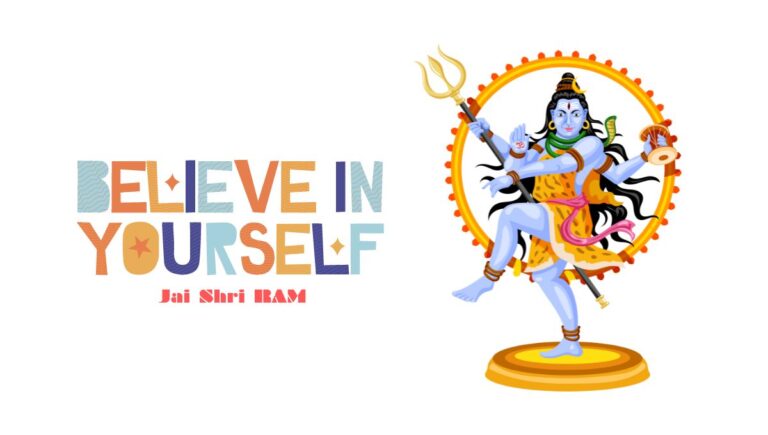
The seventh and final lesson that we can learn from the Ramayana is to have faith in God and yourself. This is another important value in Hindu culture, as well as in many other cultures around the world. Faith means to have trust, confidence, and belief in someone or something that is greater than us. Faith also means to have hope, optimism, and vision for ourselves and our future. Faith is the source of our strength, peace, and happiness. 🙏
Rama and Sita are great examples of faith in God and themselves. They always trust in God’s plan, guidance, and grace. They never doubt God’s existence, power, or love. They never lose hope in God’s justice, mercy, or glory. They always worship God with devotion, gratitude, and surrender. They also trust in themselves and their abilities.
They never doubt their own identity, purpose, or destiny. They never lose hope in their own potential, values, or goals. They always act with courage, wisdom, and righteousness. They show their faith not only by their words, but also by their actions. 💯
One of the most remarkable instances of Rama and Sita’s faith in God and themselves is when they face their final ordeal: Sita’s fire test and Rama’s horse sacrifice. These are two events that test their faith to the extreme. They challenge their love, honor, and happiness. They force them to make difficult choices and sacrifices. They expose them to criticism, doubt, and pain. They separate them from each other and from the world. 🙌
Rama and Sita’s faith in God and themselves are so great that they do not question God’s will, but accept it with grace and dignity. They do not think that God is unfair, cruel, or unloving to them. They think that God is doing his best for them and that everything is happening according to his wisdom and benevolence.
They trust that God has a good reason for allowing them to suffer and that he is blessing them with his presence and protection. They also trust in themselves and their virtues. They do not think that they are unworthy, sinful, or doomed. They think that they are pure, righteous, and blessed. They trust that they have done nothing wrong and that they have fulfilled their duties and goals. They say:
“My dear Lord Rama, you are the supreme lord of the universe. You are the source of all happiness, knowledge, and power. You are the embodiment of dharma (righteousness), artha (wealth), kama (pleasure), and moksha (liberation). You are the best among men, gods, and sages. You are my master, my friend, and my god. You have done more for me than I can ever repay. Therefore, I have faith in you, trust you, and love you. I have no doubt, no fear, no sorrow. I have only joy, peace, and bliss. You are my everything .” 💕
“My dear Mother Earth, you are the supreme mother of the universe. You are the source of all life, nourishment, and beauty. You are the embodiment of patience, generosity, and forgiveness. You are the best among mothers, goddesses, and sages. You are my mother, my friend, and my goddess. You have given me birth, education, and protection.
You have taught me dharma (righteousness), artha (wealth), kama (pleasure), and moksha (liberation). You have done more for me than I can ever repay. Therefore, I have faith in you, trust you, and love you. I have no doubt, no fear, no sorrow. I have only joy, peace, and bliss. You are my everything .” 🙏
Rama and Sita’s faith in God and themselves is so inspiring that they move everyone who hears about it.
😊 Lesson 7: Follow your dharma (duty) and karma (action)

The sixth lesson that we can learn from the Ramayana is to follow our dharma (duty) and karma (action). This is another important value in Hindu culture, as well as in many other cultures around the world. Dharma means to follow the moral and ethical principles that govern our life. Karma means to perform the actions that are appropriate for our role and situation. Dharma and karma are two concepts that guide us to live a righteous and fulfilling life.🙏
Rama and Bharata are great examples of following their dharma and karma. They always act according to their duty and role. They never deviate from their principles and values. They never compromise their integrity and honor. They always do what is right and good for themselves and others. They show their dharma and karma not only by their words but also by their actions.💯
One of the most remarkable instances of Rama and Bharata’s dharma and karma is when they deal with the issue of the throne. Rama is the rightful heir to the throne of Ayodhya, but he is exiled by his stepmother Kaikeyi, who wants her son Bharata to become the king instead. Bharata is unaware of this plot and is shocked when he learns about it. He does not want to take the throne that belongs to his elder brother. He wants to bring Rama back and make him the king.🙌
Rama and Bharata’s dharma and karma are so great that they do not act according to their personal desires, but according to their social obligations. They do not think about their own happiness, comfort, or glory. They think about their father’s honor, promise, and duty. They also think about their people’s welfare, happiness, and peace. They sacrifice their own interests and preferences for the sake of their family and society. They say:
“My dear brother Bharata, do not be sad. I am not your enemy. I am your friend. I am not angry with you, Kaikeyi, or Dasharatha. I am happy for you, Kaikeyi, and Dasharatha. I am acting according to my dharma (duty), which is to obey my father’s command and respect my mother’s wish. I am also acting according to my karma (action), which is to go into exile for 14 years and uphold the values of truth, justice, and righteousness. This is my highest duty as a son, a brother, and a prince .”
“My dear brother Rama, do not be mistaken. You are not my friend. You are my lord. You are not happy for me, Kaikeyi, or Dasharatha. You are unhappy for yourself, Sita, and Lakshmana. You are acting against your dharma (duty), which is to rule over Ayodhya as the rightful king and protect your people from harm and injustice. You are also acting against your karma (action), which is to stay in Ayodhya for your whole life and enjoy the fruits of your virtues and deeds. This is your highest duty as a son, a brother, and a king .”💕
😊 CONCLUSION
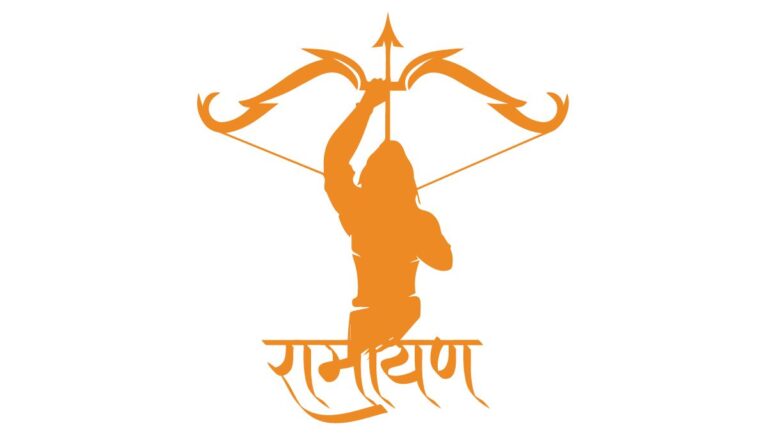
The Ramayana is a timeless and universal story that teaches us how to live a righteous and fulfilling life. It shows us the examples and actions of Rama, Sita, Lakshmana, Hanuman, Bharata, Ravana, and many other characters who play important roles in the epic. Each character has a unique personality, a distinct role, and a valuable lesson to teach us.🙌
The seven life lessons that I discussed in this blog post are:
Respect your parents and elders.
Be loyal to your spouse and family.
Choose your friends wisely and be grateful to them.
Be humble and compassionate.
Be courageous and determined.
Follow your dharma (duty) and karma (action).
Have faith in God and yourself.
These lessons are not only applicable to Hindus, but to anyone who wants to live a righteous and fulfilling life. They are universal principles that can help us overcome our challenges and achieve our goals. They are also relevant for today’s world, where we face many problems and uncertainties.💯
I hope that by applying these lessons in our daily lives, we can become better people and make the world a better place. I also hope that by reading the Ramayana, we can appreciate the beauty and wisdom of this ancient epic.🙏
If you liked this blog post, please share it with your friends and family. If you have any comments or questions, please leave them below. I would love to hear from you.😊
Thank you for reading my blog post on the seven great life lessons from the Ramayana. I hope you enjoyed it and learned something from it.😊

Thank you for your time and attention. Stay tuned for more blog posts on Inspiration, Hinduism, spirituality, and culture. Namaste. 🙏
